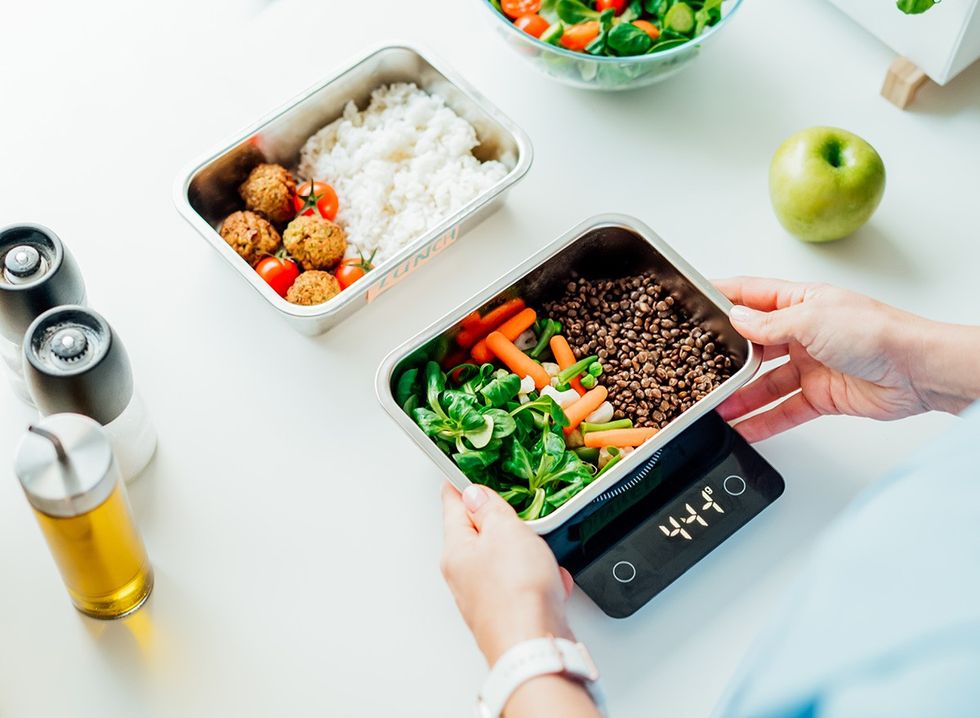The journey to better health often feels overwhelming, with each step on the scale seeming like a battle against impossible odds. Nikki Madoch knows this struggle intimately. As a certified nutrition coach and personal trainer who lost 70 pounds through Weight Watchers since 2020, she's learned that success isn't just about numbers on a scale. Her journey, which has inspired over 200,000 followers, reveals powerful lessons about sustainable weight loss that could transform your approach to healthy living.
Start Living Now: You Don't Have to Put Life on Hold
The fear of missing out on life's celebrations often holds people back from starting their weight loss journey. "I always thought that I had to be very restrictive when it came to holidays and events," Nikki reveals in her post. She discovered that success doesn't require complete sacrifice.
"I started to realize that it was fine. I wasn't going to lose all my results overnight, so enjoying a day or two of some indulgent things was fine," she explains. This realization transformed her approach to social events and holidays.
Nikki developed practical strategies to maintain balance: "I like to make sure I have a filling meal before I go to a family party or an event because then I'm not as likely to overeat on the indulgent stuff, but I can still enjoy it." She applies this same principle to everyday treats: "It's kind of like how I have an apple after dinner before I have dessert. It kind of fills me up a little bit, but then I'm still able to enjoy what I want to."
Build Your Confidence: Every Small Win Counts
Self-doubt and fear of judgment can be paralyzing. "For so long, I avoided even trying to lose weight because I felt shame and embarrassment," Nikki admits. Her confidence grew not just from physical changes, but from proving to herself that she could succeed.
"I was gaining this new confidence because I had never had success losing weight, and I couldn't believe I was actually doing it," she shares. The transformation went beyond numbers on a scale: "I for so long thought that if I could just figure this out, I felt like I could do everything else."
This newfound confidence helped her overcome concerns about others' opinions: "I was focusing on my health and my future, and the reason I was doing it is so that I could be a better person for other people as well."
Navigate Plateaus: Keep Your Journey Fresh
Weight loss isn't always linear, and that's okay. "Plateaus and burnout are completely normal," Nikki explains. She emphasizes the importance of creating sustainable habits you enjoy.
When facing her own plateau, Nikki learned to adapt: "I had to realize that there were some things that I could do to mix it up to kind of kickstart things again, whether it's switching up the foods I ate, the grocery stores I shopped at to get different ingredients and the workouts I was doing."
She discovered the importance of realistic goal-setting: "I had to reevaluate and realize, okay, maybe the goal weight I set for myself wasn't a healthy weight. Still to this day, I haven't gotten close to it, so maybe that was a little bit too low."
Choose Real Food: Find What Works for Your Body
The allure of fat-free and sugar-free options can be misleading. "When I first started, I was in a frenzy trying to find the lowest point of everything," Nikki recalls. She learned that there are better choices than these alternatives.
Her experience led to a more balanced approach: "I've really gotten a lot of those products out of what I eat and focus more on whole foods." However, she emphasizes flexibility: "Of course, I do have processed foods that I eat. It's all about balance and moderation."
This balance includes plenty of nutritious options: "I do eat a good amount of fruits and veggies and lots of protein, and I do have a lot of sources of whole foods."
Focus on Energy: Feel Better Every Day
Perhaps the most profound lesson was shifting focus from appearance to well-being. "Weight loss is so much more about how I feel than how I look," Nikki reflects. She found that increased energy, better sleep, and the ability to keep up with family became more motivating than aesthetic goals.
The changes were noticeable from the start: "Even a week in, I was feeling so much better. I had so much more energy and didn't feel as bloated, didn't feel just as weighed down."
This focus on feeling good became her lasting motivation: "What keeps me going is being able to move my body, being able to do fun activities outside, inside, run around with the dogs, play with my niece and nephew, and keep up with them, carry them around. Those things are what are important to me."
Make It Sustainable: Your Journey, Your Rules
Looking back on her success, Nikki emphasizes the importance of finding your own path: "I didn't restrict, I didn't do all of the things that I did in the past that made me miserable. I instead just took it a day at a time and focused on making it sustainable and enjoyable."
RELATED: Woman Added 800 Calories Daily and Lost 10 Pounds Without Exercise in 90 Days
The Science Behind Sustainable Weight Loss
While personal experiences are valuable, scientific research supports many of Nikki's discoveries. According to the National Weight Control Registry, "About 20% of people who lose at least 10% of their body weight maintain it for at least a year." The key factors mirror Nikki's approach: regular physical activity, consistent eating patterns, and ongoing self-monitoring.
Protein: Your Weight Loss Ally
The Mayo Clinic reports, "Protein decreases the hunger hormone ghrelin and increases hormones like peptide YY, GLP-1, and cholecystokinin, which promote feelings of fullness and satisfaction." This scientific finding explains why protein-rich meals can help maintain progress. For optimal results, WebMD suggests "Aiming for 25 to 30 grams of protein in each meal supports muscle maintenance" during weight loss.
RELATED: 10 Ways She Found Her Happy Weight After 20 Years of Dieting
Timing Matters: When You Eat Counts
The National Institutes of Health says, "Consistent meal timing aligns with the body's circadian rhythms, potentially reducing the risk of obesity and improving metabolic health." They caution, "Eating during inactive periods, such as late at night, can disrupt the body's internal clock, leading to weight gain and metabolic issues."
The Power of Preparation
Research supports the importance of meal preparation. The Mayo Clinic reports, "Regular meal preparation is linked to healthier eating habits, increased fruit and vegetable intake, and reduced consumption of processed foods." Harvard Health adds, "Preparing meals in advance allows for better portion control, reducing the likelihood of overeating and aiding in weight management."
Balanced Nutrition: Your Foundation for Success
According to the Mayo Clinic, "A balanced diet for weight loss typically includes 40-50% carbohydrates, 25-35% fat, and 20-30% protein." This flexible approach allows for personalization while maintaining nutritional balance.
Harvard Health stresses fiber's importance, noting that "High-fiber foods like fruits, vegetables, whole grains, and legumes can help control hunger and prevent overeating. Studies suggest consuming 25-30 grams of fiber daily is associated with improved weight management outcomes."
RELATED: She Walked 15K Steps for a Year and Discovered Something Unexpected About Food Freedom
Hydration: The Often Overlooked Factor
WebMD highlights that "Staying hydrated is important for weight loss. Drinking 8-10 cups of water daily not only supports metabolism but can also help reduce hunger by promoting a feeling of fullness." This simple strategy complements other weight loss efforts and becomes especially important when increasing protein intake.
The journey to better health is deeply personal yet universal in many ways. As Nikki's experience and scientific research both confirm, sustainable weight loss comes from finding an approach that fits your life, not the other way around. Whether you're just starting or looking to maintain your progress, remember that feeling better – not just looking different – is the true measure of success. And if you enjoyed this article, take advantage of these 15 Quick Ways to Lose Body Fat Percentage in a Week.






















 Shutterstock
Shutterstock Shutterstock
Shutterstock Shutterstock
Shutterstock Shutterstock
Shutterstock Shutterstock
Shutterstock Shutterstock
Shutterstock Shutterstock
Shutterstock Shutterstock
Shutterstock
 Shutterstock
Shutterstock Shutterstock
Shutterstock Shutterstock
Shutterstock Shutterstock
Shutterstock Shutterstock
Shutterstock Shutterstock
Shutterstock Shutterstock
Shutterstock Shutterstock
Shutterstock Shutterstock
Shutterstock Wikimedia Commons
Wikimedia Commons

 I'm a Nutritionist and These 9 High-Protein Snacks Keep My Clients Full While Losing 50 Pounds
I'm a Nutritionist and These 9 High-Protein Snacks Keep My Clients Full While Losing 50 Pounds
 Shutterstock
Shutterstock 2. Processed FoodsShutterstock
2. Processed FoodsShutterstock Shutterstock
Shutterstock Shutterstock/Prostock-studio
Shutterstock/Prostock-studio Shutterstock
Shutterstock Pro TipsShutterstock
Pro TipsShutterstock Shutterstock
Shutterstock Shutterstock
Shutterstock Shutterstock
Shutterstock Shutterstock
Shutterstock Don’t Drink as Much AlcoholShutterstock
Don’t Drink as Much AlcoholShutterstock Most Women on GLP-1s Are Making a Few Common MistakesShutterstock
Most Women on GLP-1s Are Making a Few Common MistakesShutterstock Soda and Sugary DrinksShutterstock
Soda and Sugary DrinksShutterstock Shutterstock
Shutterstock Eat BreakfastShutterstock
Eat BreakfastShutterstock And Improve Insulin SensitivityShutterstock
And Improve Insulin SensitivityShutterstock Shutterstock
Shutterstock The Drugs Mimic the GLP-1 Hormone Naturally Produced by the BodyShutterstock
The Drugs Mimic the GLP-1 Hormone Naturally Produced by the BodyShutterstock 3. Deep-Fried ItemsShutterstock
3. Deep-Fried ItemsShutterstock